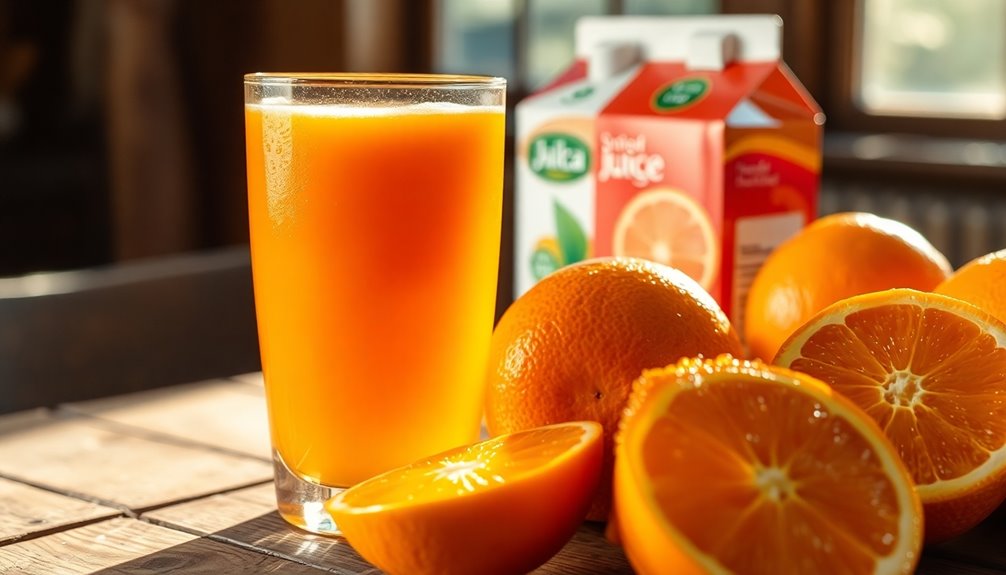Freshly squeezed orange juice lasts about 2 to 3 days in the fridge. To keep its vibrant flavor and nutrients, you should refrigerate it immediately and store it in an airtight container. Avoid letting it sit at room temperature for more than 2 hours, as bacteria can spoil it quickly. Want to learn more about how to extend its freshness and the nutritional benefits of fresh juice? There are plenty of tips and insights waiting for you!
Key Takeaways
- Freshly squeezed orange juice lasts about 2 to 3 days in the fridge at 40°F (4°C) or lower.
- Immediate refrigeration is crucial to prevent spoilage, which can occur within 2 hours at room temperature.
- Signs of spoilage include off odors, altered taste, and unusual textures.
- Store juice in an airtight container to minimize oxygen exposure and extend its shelf life.
- Freezing can preserve fresh orange juice for up to 6 months when stored properly.
How Long Does Freshly Squeezed Orange Juice Last in the Fridge?

How long can you keep freshly squeezed orange juice in the fridge before it goes bad?
Typically, it lasts about 2 to 3 days when stored in the refrigerator at 40°F (4°C) or lower. To maintain its freshness, you should refrigerate the juice immediately in an airtight container. This limits exposure to air and oxidation, which can lead to spoilage.
If you leave freshly squeezed orange juice at room temperature for more than 2 hours, bacteria growth can rapidly increase, compromising its quality.
Signs of spoilage include off odors, altered taste, and unusual textures.
Storage Tips for Fresh Orange Juice

To keep your fresh orange juice at its best, always store it in an airtight container.
This helps prevent oxidation and keeps the juice fresher for longer.
Make sure your fridge is set to the ideal temperature, ideally around 32°F to 40°F, to maximize freshness.
Airtight Container Importance
Since fresh-squeezed orange juice is highly perishable, using airtight containers is essential for maintaining its quality and safety. Storing your juice in these containers helps limit oxygen exposure, which reduces oxidation and preserves nutrient retention and flavor. To prolong freshness, fill the containers as much as possible to minimize air inside. This practice also slows down decay, ensuring your juice stays fresh longer. For best results, consider single-serving bottles to avoid repeated opening, which increases air exposure. Additionally, keeping your juice in a cool environment can enhance its longevity, as air quality plays a significant role in the preservation of perishable items.
| Storage Tip | Benefit |
|---|---|
| Use airtight containers | Prevents bacteria growth |
| Minimize air space | Extends shelf life |
| Keep cool | Slows down decay |
| Single-serving bottles | Reduces oxygen exposure |
Optimal Refrigeration Temperature
Maintaining the right storage conditions is key to preserving the quality of your fresh-squeezed orange juice. To maximize its shelf life, store your juice in the refrigerator at an ideal refrigeration temperature of 32 to 40 degrees Fahrenheit.
When kept properly, freshly squeezed orange juice will last about 2 to 3 days before you notice any decline in quality. Be sure to use airtight containers to minimize oxygen exposure, which can lead to spoilage.
It's also important to keep your juice away from direct sunlight and strong artificial light to maintain its freshness and nutrients. Fill containers as much as possible and seal them tightly after each use to guarantee your juice stays delicious for longer.
The Importance of Refrigeration vs. Room Temperature

When you freshly squeeze orange juice, immediate refrigeration is imperative to extend its shelf life.
Leaving it at room temperature can lead to rapid spoilage and increased bacteria growth within just a couple of hours.
To keep your juice safe and fresh, always store it in the fridge at 40°F (4°C) or lower.
Refrigeration Extends Shelf Life
Refrigeration plays an essential role in extending the shelf life of freshly squeezed orange juice. When you store your juice at 40°F (4°C) or lower, it can last about 2 to 3 days, preserving its rich vitamin C content. Immediate refrigeration in an airtight container is important to maximize freshness and prevent spoilage. At room temperature, your juice can spoil in just 2 hours due to rapid bacteria growth. To further extend its shelf life, consider using single-serving bottles to minimize air exposure. Proper storage practices, like keeping your juice away from direct sunlight and securely sealing containers, are critical for maintaining quality and ensuring that you enjoy every sip of your delicious, nutritious juice. Additionally, consuming fresh juice can provide antioxidants that combat skin aging, promoting overall health and wellness.
Risks of Room Temperature
Leaving freshly squeezed orange juice at room temperature can quickly lead to spoilage and health risks.
After just two hours, the juice becomes highly susceptible to bacteria growth, dramatically shortening its shelf life. When stored above 40°F (4°C), the risk of foodborne illness increases as bacteria multiply rapidly.
Unlike pasteurized juices, fresh-squeezed orange juice lacks preservatives, making it even more vulnerable to spoilage. If you want to enjoy your juice safely, immediate refrigeration is essential.
Always store your freshly squeezed orange juice right after preparation to maintain its freshness and prevent any health hazards. Remember, keeping it cool not only preserves flavor but also protects you from potential foodborne illnesses. Additionally, freshly squeezed orange juice typically lasts only 2-3 days in the fridge due to its lack of preservatives.
Don't take chances—refrigerate!
Freezing Fresh Orange Juice: A Comprehensive Guide

Freezing fresh orange juice is a fantastic way to preserve its vibrant flavor and nutrients, especially if you've got more than you can drink right away.
You can freeze fresh squeezed orange juice for up to 6 months, extending its shelf life considerably compared to just refrigerating it. Use airtight containers or ice cube trays, making sure to leave at least 1/2 inch of headspace for fluid expansion during freezing.
When you're ready to enjoy it, thaw your juice in the refrigerator, cold water, or microwave, avoiding room temperature thawing to prevent spoilage.
Signs That Your Orange Juice Has Gone Bad

When it comes to enjoying fresh squeezed orange juice, knowing the signs of spoilage is essential for your health and taste buds.
Here are some indicators that your juice has gone bad:
- An off odor or unpleasant taste can ruin your experience and signal spoilage.
- Changes in appearance, like separation or off-color, suggest the juice may not be safe to drink.
- Look for mold formation on the surface; this is a definite sign to discard it immediately.
Always remember the recommended storage duration is just 2 to 3 days in the refrigerator.
If your freshly squeezed orange juice exceeds this timeframe, even if it looks fine, it’s best to toss it out for safety. While the vibrant color and fresh smell of the juice might tempt you to consume it, bacteria can grow rapidly in fruit juices, leading to potential health risks. It’s also important to consider that different juices have varying shelf lives; for instance, apple juice digestion time is typically longer due to its higher sugar content, which can affect how quickly your body processes it. Always prioritize food safety to ensure your juice is not only delicious but also safe to drink.
Nutritional Benefits of Freshly Squeezed Orange Juice

After ensuring your fresh squeezed orange juice is safe to drink, you'll want to appreciate its numerous nutritional benefits.
This juice is packed with vitamin C, providing about 124% of your daily needs in just one 8-ounce serving, which is great for boosting your immune system and supporting skin health. The natural antioxidants, like flavonoids and carotenoids, help fight oxidative stress and may lower your risk of chronic diseases.
Plus, freshly squeezed orange juice enhances iron absorption, especially when enjoyed with iron-rich foods. Unlike processed alternatives, it avoids nutrient loss from pasteurization, preserving its benefits.
Including the pulp boosts dietary fiber, promoting digestion and maintaining healthy cholesterol levels. Enjoy this nutritious beverage for a healthful boost!
Tips for Extending the Freshness of Your Juice

To keep your freshly squeezed orange juice tasting great and packed with nutrients, store it in airtight containers right away. This minimizes air exposure and helps prevent oxidation.
Here are some tips to extend freshness:
- Refrigerate your juice immediately, keeping it at 32°F to 40°F (0°C to 4°C) for up to 2 to 3 days.
- Fill containers as much as possible to limit oxygen, which contributes to spoilage.
- Add natural antioxidants, like lemon or lime juice, to boost freshness and vitamin C content.
For longer storage, consider freezing your juice in appropriate containers, allowing for expansion.
Frozen juice can last up to 6 months, ensuring you enjoy that delicious taste whenever you want!
The Difference Between Fresh Squeezed and Store-Bought Juice

While you might think all orange juice is created equal, the differences between fresh-squeezed and store-bought varieties are striking.
Freshly squeezed juice typically lasts just 2 to 3 days in your fridge, while store-bought orange juice can last up to 10 days after opening, thanks to preservatives.
However, this longer shelf life comes at a cost; store-bought options often lose valuable nutrients during processing and may contain added flavor packs to mask their taste.
In contrast, fresh-squeezed juice bursts with vibrant flavor and retains more vitamins and enzymes.
Keep in mind that even products labeled "100% orange juice" can differ considerably in quality and taste, so always read the labels and choose wisely to enjoy the authentic experience.
Frequently Asked Questions
How Long Will Freshly Squeezed Orange Juice Last?
Freshly squeezed orange juice lasts about 2 to 3 days in the fridge at 40°F (4°C) or lower.
If you leave it out at room temperature, it'll spoil within just 2 hours due to bacteria growth.
To keep it fresh, store it in airtight containers and fill them up to limit oxygen exposure.
If you freeze it, the juice can last up to 6 months, but be sure to consume it right after thawing.
How Long Does Freshly Squeezed Juice Last in the Fridge?
When it comes to freshly squeezed juice, you'll want to keep your eye on the clock.
It typically lasts about 2 to 3 days in the fridge, as long as you store it in an airtight container.
If you leave it out at room temperature, spoilage can kick in after just 2 hours.
Always check for any off smells or changes in color before drinking.
Refrigeration is key to keeping it fresh!
Is Orange Juice Good After 10 Days?
No, orange juice isn't good after 10 days.
You should consume freshly squeezed orange juice within 2 to 3 days for the best flavor and safety.
After 10 days, it can develop off odors and flavors, indicating spoilage.
If you've had it sitting out at room temperature, it's even riskier.
Always check for any changes in smell, taste, or appearance before deciding to drink juice that's been stored too long.
Can I Drink 2 Week Old Orange Juice?
You know what they say: "Better safe than sorry."
Drinking 2-week-old orange juice isn't a good idea. By that time, it's likely spoiled, even if it's been in the fridge. You might notice off smells or flavors, and it could pose a risk of foodborne illness.
It's best to toss it and squeeze fresh juice instead. Your health's worth more than a few sips of questionable juice.
Conclusion
To sum up, when you squeeze those oranges, you're not just making juice; you're creating a revitalizing elixir that packs a nutritional punch. Remember to keep it chilled for maximum freshness, and if you can't drink it all, freeze it like it's 1999! By following these tips, you can enjoy that vibrant flavor longer and reap the benefits. So, go ahead and pour yourself a glass of sunshine—you deserve it!
Cindy thoroughly researches juicing trends, techniques, and recipes to provide readers with practical advice and inspiration. Her writing style is accessible, engaging, and designed to make complex concepts easy to understand. Cindy’s dedication to promoting the advantages of juicing shines through her work, empowering readers to make positive changes in their lives through the simple act of juicing.











